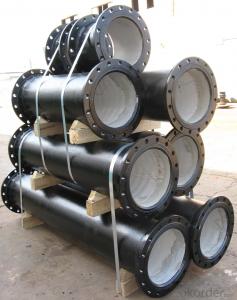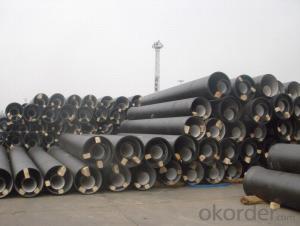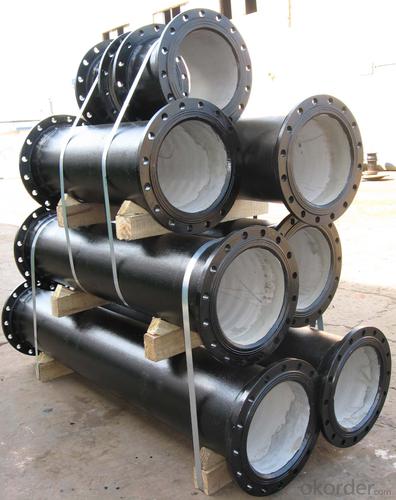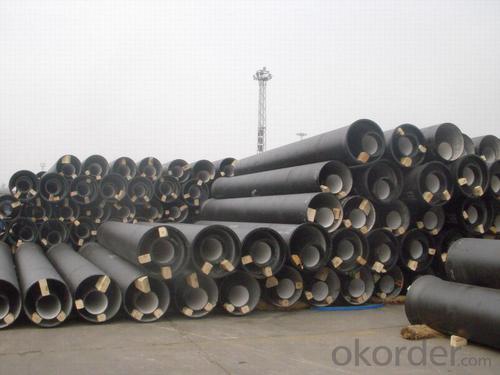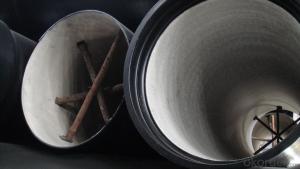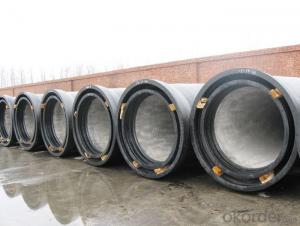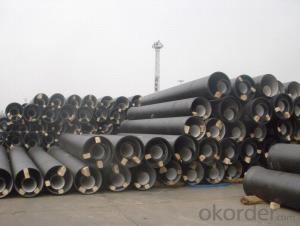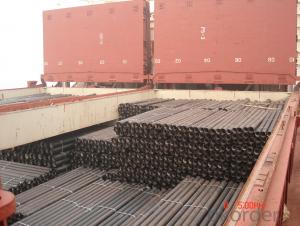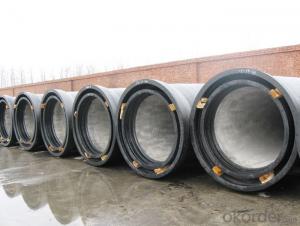Ductile Iron Pipe ISO2531 C CLASS DN1500
- Loading Port:
- China main port
- Payment Terms:
- TT or LC
- Min Order Qty:
- 20 m.t.
- Supply Capability:
- 50000 m.t./month
OKorder Service Pledge
OKorder Financial Service
You Might Also Like
1.Ductile Iron Pipe Description :
1) Pipes confirm to ISO2531,K9 class,T type joint,6m long,with inside cements lining conform to ISO4179, outside Zinc
spraying(130g/m2) and bitumen coating(70μm) conform to ISO8179.
2) Pipe ends: Spigot and socket ends, with 100% SBR rubber gaskets accoding to ISO4633
3) we can do third party inspection according to customer's request.
2.Main Features of the Ductile Iron Pipe:
1).Quality guarantee
• Chemical checking
• NDE after rough machining
• Mechanical testing after heat treatment
• Final NDE,dimension inspected
2).Quality document
• Full Q.A document as per client request
3).Packing and Shipping
• standard export package(carton/wooden case/pallet)
• accept FOB,FAS,CNF,CIF door to door etc or customer designated shipping agent
4).Service
• Drawing: we can translate your original drawing, offer best suggestion on design
• Quality: we have full set quality control system to guarantee the best quality.
• Inspection: inspect in house, all our products must be checked 3 times before packing
5)Inspection
• In-house Foundry
• Third party inspection available upon requirement
3.Ductile Iron Pipe Images:
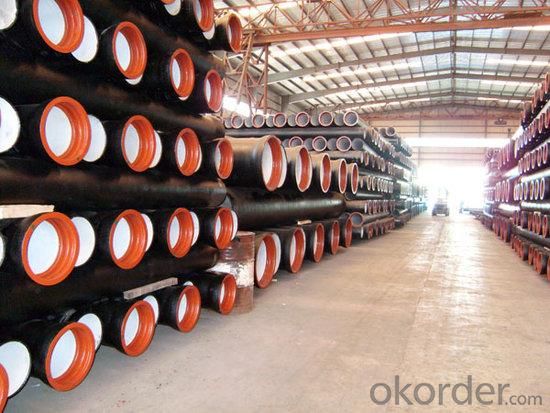
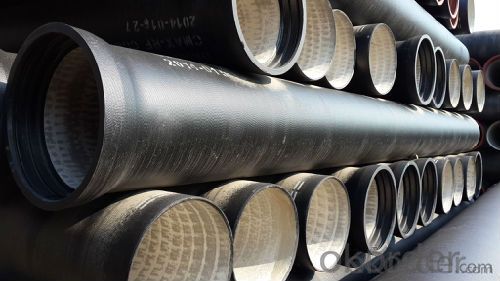
4.Ductile Iron Pipe Specification:
Surface Finishes: Bare, Oiled, Mill Varnish, Galv,FBE, FBE Dual, 3LPE, 3LPP, Coal Tar,Concrete Coating and Tape Wrap
End Finishes: Beveled, Square Cut, Threaded, hat
Additional Services: Internal Coating
Packaging: packed in bag, plastic bag, steel strip, steel wire,double wire, iron box, wooden box, tarpaulin, plastic
sheeting
Inspection: MOODY SGS BV GL DNV ABS LIOYD’S
Test: X-ray, UT, magnetic particle,inspection,hydrostatic test.
Processing service: Beveling, Threading, Slotting, Cut-to length, Bends, Quench and Temper, Fabrication, Double-jointing
and On-site assistance
Documentary: MTC, material certification,Origin certification, CI or PI,Test Report, export licence, handling order,
B/L,insurance policy,shipping instructions, contract, packing list etc.
5.FAQ:
We have organized several common questions for our clients,may help you sincerely:
1.Q: Why would you choose ductile iron pipe rather than other pipe materials?
A:The reasons are obvious for that not only ductile iron pipe possesses the inherent strength and flexibility of ductile
iron, combined with proven corrosion protection systems, but also the cost savings can be achieved from design to
installation and commissioning.
2.Q:Why can you guarantee the inner of pipes can’t be corroded?
A: High alumina cement mortar lining and sulphate-resistant cement mortar lining. These two special linings are applicable
to inner anti-corrosion for sewage pipes, improving resistance to erosion of the sewage components.
- Q: What are the different types of ductile iron pipe joints?
- Various applications commonly utilize different types of ductile iron pipe joints to ensure efficient fluid transfer and prevent leaks. These joints provide strong and reliable connections between pipes. Some of the most frequently used types of ductile iron pipe joints are as follows: 1. Push-on Joint: This joint is simple to install and does not require any special tools. The spigot end of one pipe is inserted into the bell end of another pipe, creating a tight seal. A rubber gasket is typically used to enhance leak resistance. 2. Mechanical Joint: Water and wastewater applications often use mechanical joints. They consist of a gland, a rubber gasket, and a follower gland. The pipe ends are pushed into the gland, and the follower gland is tightened, compressing the rubber gasket and establishing a secure connection. 3. Restrained Joint: These joints are designed to withstand high internal and external forces, such as water pressure or soil loadings. Rubber gaskets and restraining mechanisms like bolts or wedges are commonly used to prevent pipe movement or separation under stress. 4. Flanged Joint: Large diameter pipes or applications requiring frequent disassembly often employ flanged joints. Each pipe end is equipped with a flange, which is then bolted together with gaskets to create a strong connection. Flanged joints provide convenient access for maintenance or repairs. 5. Welded Joint: Welded joints involve heating and fusing the pipe ends to form a permanent connection. This type of joint is typically used in high-pressure applications where a reliable and leak-free connection is crucial. Skilled labor and specialized equipment are required for welded joints. To ensure the integrity and longevity of the ductile iron pipe system, it is important to choose the appropriate joint based on the specific application, pipe size, and operating conditions. Consulting with a professional engineer or pipe manufacturer can help determine the most suitable joint for a particular project.
- Q: Are ductile iron pipes suitable for power plant cooling systems?
- Ductile iron pipes are well-suited for power plant cooling systems, offering numerous advantages that render them perfect for such applications. Firstly, their high strength and durability enable them to withstand the immense pressure and heavy loads typically associated with power plant cooling systems. Additionally, these pipes exhibit excellent resistance to corrosion, a vital feature in an environment where water and other cooling fluids continuously flow. Moreover, they boast good thermal conductivity, ensuring efficient heat transfer away from power plant equipment and contributing to the overall cooling process. Lastly, ductile iron pipes are cost-effective compared to other commonly used materials in power plant cooling systems, making them a practical choice. Ultimately, due to their strength, corrosion resistance, thermal conductivity, and cost-effectiveness, ductile iron pipes represent a reliable and suitable option for power plant cooling systems.
- Q: Are ductile iron pipes suitable for road crossings?
- Yes, ductile iron pipes are suitable for road crossings. Ductile iron is a strong and durable material, making it well-suited for underground installations such as road crossings. The pipes have high tensile strength, which allows them to withstand heavy loads and traffic pressures without cracking or breaking. Ductile iron pipes also have excellent corrosion resistance properties, ensuring their longevity even in harsh environments. Additionally, these pipes are easy to install and maintain, making them a reliable choice for road crossings.
- Q: What is the expected cyclic fatigue life of ductile iron pipes?
- Various factors such as material composition, pipe design, loading conditions, and environmental factors can affect the expected cyclic fatigue life of ductile iron pipes. However, ductile iron pipes are widely recognized for their exceptional ability to withstand fatigue. Ductile iron pipes are specifically engineered to endure cyclic loading, which is common in water distribution and sewer systems due to fluctuating pressures and vibrations. These pipes possess a unique microstructure that confers high strength and ductility, enabling them to resist crack formation and growth under cyclic loading. Numerous studies and industry standards have provided estimates for the expected cyclic fatigue life of ductile iron pipes. For instance, the American Water Works Association (AWWA) C151 standard recommends a design life of 100 years for ductile iron pipes used in water distribution systems, underscoring their long-term durability and resistance to fatigue. Furthermore, research studies have demonstrated that ductile iron pipes can withstand over 1 million cycles of loading without exhibiting any signs of fatigue failure. The fatigue strength of ductile iron pipes can be further augmented by employing protective coatings or linings to reduce the impact of corrosion and abrasion. Nevertheless, it is important to recognize that various factors, such as manufacturing quality, installation practices, and maintenance procedures, can influence the expected cyclic fatigue life of ductile iron pipes. Regular inspections, appropriate handling, and adherence to recommended installation guidelines can help ensure the longevity and performance of ductile iron pipes. In conclusion, while the expected cyclic fatigue life of ductile iron pipes can be subject to variation due to several factors, these pipes are generally renowned for their outstanding fatigue resistance and offer a dependable and enduring solution for water distribution and sewer systems.
- Q: Is the spigot and socket connection of the ductile iron tube reversed?
- The three pass joint is formed by flattening a tube blank larger than three through diameter to approximately three through the diameter and opening a hole at the point of the branch pipe;
- Q: Can ductile iron pipes be used for large-scale irrigation systems?
- Yes, ductile iron pipes can be used for large-scale irrigation systems. Ductile iron pipes are known for their strength, durability, and resistance to corrosion, making them suitable for various applications including irrigation. These pipes are able to withstand high pressure and can handle the demands of large-scale irrigation systems. Additionally, ductile iron pipes have a long lifespan, reducing the need for frequent replacements and maintenance. They are also cost-effective compared to other materials used in irrigation systems. Therefore, ductile iron pipes are a suitable choice for large-scale irrigation systems due to their strength, durability, corrosion resistance, and cost-effectiveness.
- Q: How does ductile iron pipe perform in areas with high groundwater contamination?
- Ductile iron pipe is known for its durability and resistance to corrosion, making it a suitable choice for areas with high groundwater contamination. The pipe's protective lining and coating prevent the groundwater from coming into direct contact with the iron, thereby minimizing the risk of corrosion and deterioration. Additionally, ductile iron pipe has the ability to withstand external pressures, making it less susceptible to damage caused by shifting soils or groundwater movement. This characteristic is especially beneficial in areas with high groundwater contamination, as the pipe can maintain its structural integrity and prevent leaks or bursts. Furthermore, ductile iron pipe has a long service life, which reduces the need for frequent replacements and minimizes the potential for groundwater contamination caused by pipe failures. Overall, ductile iron pipe performs exceptionally well in areas with high groundwater contamination, providing a reliable and durable solution for transporting water or wastewater while ensuring the protection of the surrounding environment.
- Q: Are ductile iron pipes suitable for wastewater pumping stations?
- Yes, ductile iron pipes are suitable for wastewater pumping stations. Ductile iron is a strong and durable material that can withstand the harsh and corrosive nature of wastewater. It has excellent resistance to abrasion, corrosion, and impact, making it a reliable choice for wastewater applications. Additionally, ductile iron pipes have a high tensile strength and can handle high-pressure situations, making them suitable for pumping stations where wastewater needs to be transported over long distances or through elevated areas. The smooth interior surface of ductile iron pipes also helps to minimize friction and enhance the flow of wastewater, reducing the risk of clogging or blockages. Overall, ductile iron pipes provide a cost-effective and long-lasting solution for wastewater pumping stations.
- Q: What material is ductile cast iron 235A?
- Pig iron is an alloy of iron and carbon carbon content more than 2%, pig iron carbon content is generally in 2.5%--4%, including C, SI, and Mn, S, P and other elements, is the use of iron ores in blast furnace products. According to the different forms of carbon in pig iron, and can be divided into pig iron, cast iron and steel ball ductile cast iron. Several precipitation of spherical graphite cast iron. The cutting action on the metal substrate than spheroidal graphite flake graphite cast iron, the strength of the matrix organization strength of 70 ~ 90%, the tensile strength is up to 120kgf/mm2, and has good toughness. Ductile iron chemical composition besides iron usually contains: the amount of carbon 3.3.8%, silicon 2.3.0%, manganese, phosphorus, sulfur and no more than 1.5% of the total amount of rare earth, magnesium spheroiditic agent.
- Q: What is the difference between cast iron pipe and seamless steel pipe and galvanized steel pipe?
- Galvanized steel pipe: divided into cold galvanized steel pipe, hot galvanized steel pipe, cold galvanized steel pipe has been banned, and the latter is also advocated by the state for the time being. In 60s and 70s, developed countries began to develop new types of pipes, and galvanized pipes were banned. China's Ministry of construction and other four ministries also issued a civilization, indeed from two, 000 years since the galvanized pipe as a water supply pipe, the New District cold water pipe has rarely used galvanized pipe, and some of the hot water pipe is galvanized pipe. Hot dip galvanized steel pipe is widely used in fire, power and highway.
Send your message to us
Ductile Iron Pipe ISO2531 C CLASS DN1500
- Loading Port:
- China main port
- Payment Terms:
- TT or LC
- Min Order Qty:
- 20 m.t.
- Supply Capability:
- 50000 m.t./month
OKorder Service Pledge
OKorder Financial Service
Similar products
Hot products
Hot Searches
Related keywords
